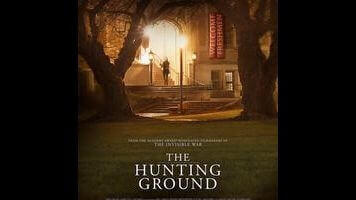At some colleges, it’s easier to get kicked out for cheating than for raping someone. That’s not the central thesis of Kirby Dick’s The Hunting Ground, a documentary about sexual assault on college campuses. Instead, a statistic about the number of students expelled from a particular school for sexual assault versus the number expelled for other “honor code” violations like cheating flashes by quickly, amidst a barrage of other damning factoids. It’s a testament to the wealth of this material that the point is a passing one—just one incidence of institutional hypocrisy among many.
For some stretches, The Hunting Ground looks as if it may succumb to a common talking-head doc problem: cutting together interviews and stats in a way that doesn’t particularly separate the film from a well-researched magazine article (and sometimes lacking the driving narrative that good prose can add). Though the filmmaking relies a lot on those techniques, plus lots of B-roll footage that sometimes mismatches campuses with descriptions of incidents that took place elsewhere, the movie stands out with the sheer number of victims on camera, taking a stand against what happened to them. The only anonymous testimony comes from a campus rapist who briefly speaks out about his admitted guilt and shame, a welcome reversal of the appalling victim-shaming described over and over in the film.
The movie also subtly refutes those victim-blaming narratives that attribute assaults to youthful carelessness and bad decisions with a story from a Harvard Law student assaulted in her third year—information that functions as a chilling argument that campuses may be, at present, inherently conducive to this kind of criminal behavior, and to repeat offenses. While some of the anecdotes focus on specific schools like University Of North Carolina At Chapel Hill (Dick is never reluctant to name names), eventually the number of colleges from across the country blur together. Think of a famous school, and it may well appear in The Hunting Ground. The institutions unite in unintentional solidarity during a montage of TV reporters reading statements from various administrations, all stressing that they take these cases “very seriously.”
Institutional power and cowardice, then, emerge as major villains. One interviewee refers to campus frats as the “fraternity industry,” and the invocations of industry taking precedent over individuals occur throughout the film. Colleges discourage victims from reporting their assaults in an attempt to stay on-brand as a safe, brochure-perfect place for parents to spend tuition money. The schools, the film shows, are equally reluctant to crack down on corruption and wrongdoing in the fraternity system (which saves the schools housing costs and gains them big alumni loyalty) or student athletics (subject of a major sidebar late in the film, with recently cleared Florida State quarterback Jameis Winston as a case study of sorts). Dick, perhaps wary of sounding like a conspiracy-monger, doesn’t explicitly tie these elements together. But the connections among these institutions remain clear; they all use hearings, honor codes, and self-investigations as means of protecting themselves, not students.
With its slightly loose structure, The Hunting Ground is most bracing when it turns personal, however briefly: opening footage that captures young women reacting to their college acceptances with elation; the story of a young Notre Dame woman whose life was destroyed when she spoke up about her assault; and, most inspiring, its frequent check-ins with a pair of UNC students who wind up traveling the country, informing other students how to file Title IX complaints without lawyers. More of this footage might give a better sense of the people neglected as both individuals and as a group, but the glimpses are still effective. The Hunting Ground isn’t necessarily a great film—but it doesn’t need to be to work as powerful advocacy.













![HBO teases new Euphoria, Larry David, and much more in 2026 sizzle reel [Updated]](https://img.pastemagazine.com/wp-content/avuploads/2025/12/12100344/MixCollage-12-Dec-2025-09-56-AM-9137.jpg)



























